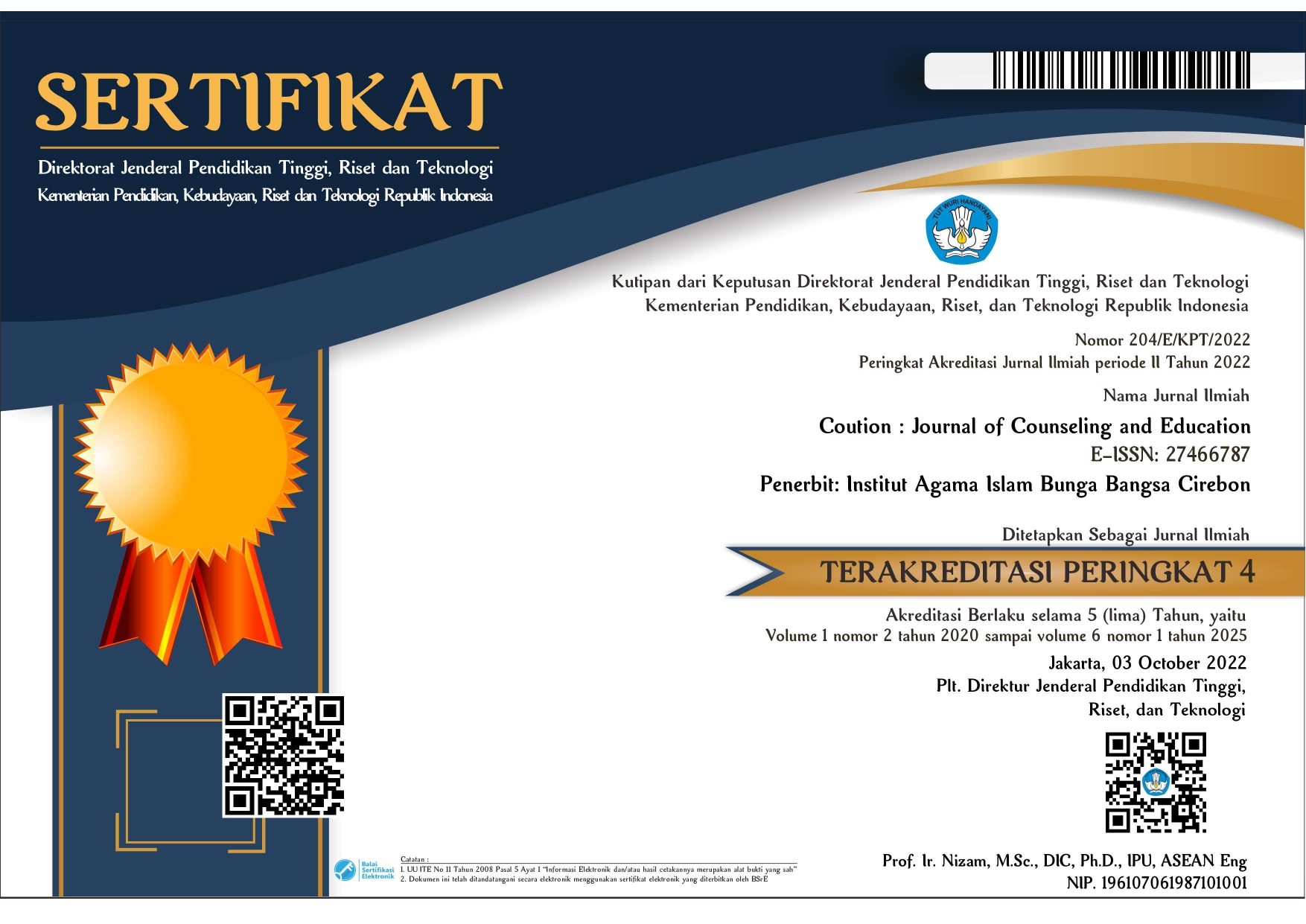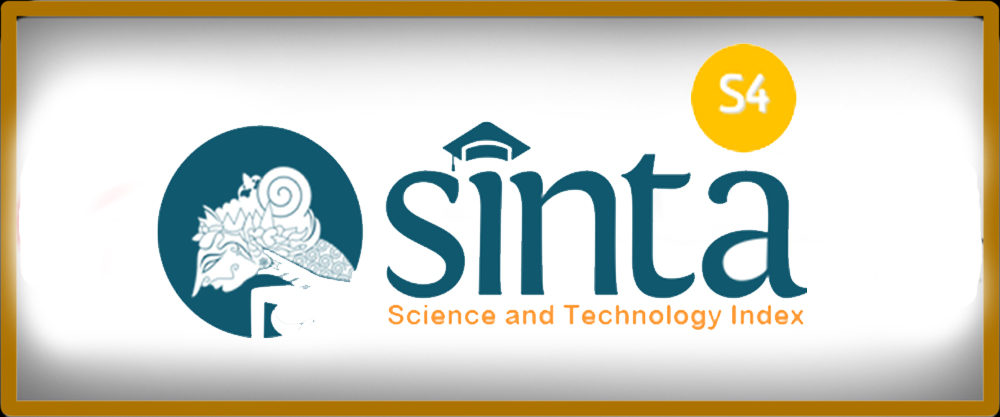Studi Deskriptif: Prevalensi Flourishing Mahasiswa Dan Implikasinya Pada Bimbingan Dan Konseling
Abstract
Psikologi positif memfokuskan kajian pada upaya mengembangkan, menciptakan, dan menemukan situasi yang positif ke arah lingkungan yang mampu menciptakan kekuatan untuk individu itu sendiri. Konsep populer yang baru-baru ini dibahas dalam psikologi positif yaitu berkaitan dengan flourishing, yang menggambarkan kemampuan individu untuk berkembang secara optimal, berfungsi seutuhnya, merasakan kenyamanan dan kepuasan dalam menjalani kehidupan. Selain itu Flourishing dideskripsikan sebagai individu yang mampu memanfaatkan seluruh potensi yang dimilikinya demi suatu tujuan dan sangat menikmati perannya dalam menjalani proses tersebut. Flourishing sangat penting dimiliki oleh calon konselor dalam proses pemberian bantuan pada klien. Penelitian ini dilakukan terhadap 109 siswa bimbingan dan konseling yang berusia antara 17 hingga 25 tahun untuk mengetahui tingkat flourishing mereka sebagai calon konselor/helper. Penelitian ini menggunakan flourishing scale untuk pengumpulan data dan studi deskriptif untuk analisis data. Hasil penelitian menunjukkan bahwa 74% siswa berada pada kategori berkembang tinggi, 23% berada pada kategori sedang, dan hanya 3% yang berada pada kategori rendah. Hal ini menunjukkan bahwa individu dengan tingkat flourishing yang tinggi lebih mampu menangani emosinya dan mengelola berbagai peristiwa kehidupan, sedangkan individu dengan tingkat flourishing rendah cenderung memiliki pandangan negatif terhadap kehidupan dan kesulitan mengelola emosinya.
Downloads
References
students with special needs (Position statement). Retrieved from
www.schoolcounselor.org/files/ PositionStatements.pdf.
Biswas-Diener, R. (2009). New measures of well-being: Flourishing and positive and
negative feelings. Social Indicators Research, 39, 247–266.
Datu, J. A. D. (2018). Flourishing is associated with higher academic achievement and
engagement in Filipino undergraduate and high school students. Journal of Happiness
Studies, 19(1), 27–39.
Diener, E., Wirtz, D., Tov, W., Kim-Prieto, C., Choi, D., Oishi, S., & Biswas-Diener, R.
(2010). New well-being measures: Short scales to assess flourishing and positive and
negative feelings. Social Indicators Research, 97, 143–156.
Effendy, N. (2016). Konsep flourishing dalam psikologi positif: Subjective well-being atau
berbeda. Seminar Asean Psychology & Humanity, 2004, 326–333.
Eraslan-Capan, B. (2016). Social connectedness and flourishing: The mediating role of
hopelessness. Universal Journal of Educational Research, 4(5), 933–940.
Fadhillah, N. S., & Masturah, A. N. (2023). Kepuasan Hidup dan Flourishing pada Karyawan
Tambang. PSIKODIMENSIA, 22(1), 96–102.
Fowers, B. J., & Owenz, M. B. (2010). A Eudaimonic Theory of Marital Quality. Journal of
Family Theory & Review, 2(4), 334–352. https://doi.org/10.1111/j.1756-
2589.2010.00065.x
Herdiansyah, D., & Puteri, N. H. (2023). Flourishing Bagi Mahasiswa Bimbingan Dan
Konseling Sebagai Calon Helper. JCOSE Jurnal Bimbingan Dan Konseling, 6(1), 8–
17.
Iskandar, A., Fitriani, R., Ida, N., & Sitompul, P. H. S. (2023). Dasar Metode Penelitian.
Yayasan Cendekiawan Inovasi Digital Indonesia.
Jonathan, L., & Mangundjaya, W. L. (2023). RASA BERSYUKUR SEBAGAI PREDIKTOR
FLOURISHING PADA DEWASA AWAL. EZRA SCIENCE BULLETIN, 1(2).
Keyes, C. L. (2002). The mental health continuum: From languishing to flourishing in life.
Journal of Health and Social Behavior, 207–222.
Keyes, C. L. (2003). Complete mental health: An agenda for the 21st century.
Khoirunnisa, A., & Ratnaningsih, I. Z. (2016). Optimisme dan kesejahteraan psikologis pada
mahasiswa pendidikan dokter Fakultas Kedokteran Universitas Diponegoro. Jurnal
Empati, 5(1), 1–4.
Makhmudah, U. (2017). Mempersiapkan Kompetensi Kepribadian Calon Konselor untuk
Menghadapi Masyarakat Ekonomi ASEAN (MEA). Jurnal Psikoedukasi Dan
Konseling, 1(1), 71.
Masturah, A. N., & Hudaniah, H. (2022). Efikasi Diri dan Dukungan Sosial sebagai Prediktor
Flourishing pada Dewasa Awal. Jurnal Ilmiah Psikomuda (JIPM) Connectedness,
2(1).
Ouweneel, E., Le Blanc, P. M., & Schaufeli, W. B. (2011). Flourishing students: A
longitudinal study on positive emotions, personal resources, and study engagement.
The Journal of Positive Psychology, 6(2), 142–153.
https://doi.org/10.1080/17439760.2011.558847
Parola, A., & Marcionetti, J. (2022). Positive resources for flourishing: The effect of courage,
self-esteem, and career adaptability in adolescence. Societies, 13(1), 5.
Pasmawati, H. (2015). Pendekatan Logoteraphy dalam Konseling. Jurnal Ilmiah Syi’ar,
15(1), 53–64.
Santrock, J. W. (2012). Perkembangan Masa-Hidup, Edisi ketiga belas. Jakarta: Erlangga.
Sarmadi, S. (2018). Psikologi Positif. Titah Surga.
Satici, S., Uysal, R., & Akin, A. (2013). Investigating the relationship between flourishing
and self-compassion: A structural equation modeling approach. Psychologica Belgica,
53(4).
Schotanus-Dijkstra, M., Pieterse, M. E., Drossaert, C. H. C., Westerhof, G. J., De Graaf, R.,
Ten Have, M., Walburg, J. A., & Bohlmeijer, E. T. (2016). What Factors are
Associated with Flourishing? Results from a Large Representative National Sample.
Journal of Happiness Studies, 17(4), 1351–1370. https://doi.org/10.1007/s10902-015-
9647-3
Sekarini, A., Hidayah, N., & Hayati, E. N. (2020). Konsep Dasar Flourishing Dalam
Psikologi Positif. Psycho Idea, 18(2), 124–134.
Seligman, M. (2018). PERMA and the building blocks of well-being. The Journal of Positive
Psychology, 13(4), 333–335. https://doi.org/10.1080/17439760.2018.1437466
Seligman, M. E. (2002). Authentic happiness: Using the new positive psychology to realize
your potential for lasting fulfillment. Simon and Schuster.
Seligman, M. E. (2011). Flourish: A visionary new understanding of happiness and wellbeing. Simon and Schuster.
Smith, C. (2019). To flourish or destruct: A personalist theory of human goods, motivations,
failure, and evil. University of Chicago Press.
Soysa, C. K., & Wilcomb, C. J. (2015). Mindfulness, Self-compassion, Self-efficacy, and
Gender as Predictors of Depression, Anxiety, Stress, and Well-being. Mindfulness,
6(2), 217–226. https://doi.org/10.1007/s12671-013-0247-1
Umucu, E., Grenawalt, T. A., Reyes, A., Tansey, T., Brooks, J., Lee, B., Gleason, C., & Chan,
F. (2019). Flourishing in Student Veterans With and Without Service-Connected
Disability: Psychometric Validation of the Flourishing Scale and Exploration of Its
Relationships With Personality and Disability. Rehabilitation Counseling Bulletin,
63(1), 3–12. https://doi.org/10.1177/0034355218808061
Verma, Y., & Tiwari, G. K. (2017). Self-Compassion as the Predictor of Flourishing of the
Students. The International Journal of Indian Psychology, 4(3), 10–29.
Wahdi, A. E., Setyawan, A., Putri, Y. A., & Wilopo, S. A. (2022). National Adolescent
Mental Health Survey (I-NAMHS) Laporan Penelitian. Pusat Kesehatan Reproduksi.
Wibowo, M. E. (2019). KONSELOR PROFESIONAL ABAD 21. Unnes Press.
Wolbert, L. S., De Ruyter, D. J., & Schinkel, A. (2019). What Kind of Theory Should Theory
on Education for Human Flourishing Be? British Journal of Educational Studies,
67(1), 25–39. https://doi.org/10.1080/00071005.2017.1390061
Zellatifanny, C. M., & Mudjiyanto, B. (2018). Tipe penelitian deskripsi dalam ilmu
komunikasi. Diakom: Jurnal Media Dan Komunikasi, 1(2), 83–90.
Zulfa, N. A., & Prastuti, E. (2020). †Welas Asih Diriâ€TM dan †Bertumbuhâ€TM:
Hubungan Self-Compassion dan Flourishing pada Mahasiswa. MEDIAPSI, 6(1), 71–
78.


















